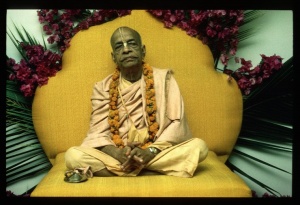SB 4.9.39-40: Difference between revisions
(Vanibot #0018 edit: make synonym terms in Sanskrit italic in SB - Vanisource) |
(Vanibot #0054 edit - transform synonyms into clickable links, which search similar occurrences) |
||
| Line 28: | Line 28: | ||
<div class="synonyms"> | <div class="synonyms"> | ||
''sat-aśvam'' | ''[//vanipedia.org/wiki/Special:VaniSearch?s=sat&tab=syno_o&ds=1 sat]-[//vanipedia.org/wiki/Special:VaniSearch?s=aśvam&tab=syno_o&ds=1 aśvam]'' — drawn by very fine horses; ''[//vanipedia.org/wiki/Special:VaniSearch?s=ratham&tab=syno_o&ds=1 ratham]'' — chariot; ''[//vanipedia.org/wiki/Special:VaniSearch?s=āruhya&tab=syno_o&ds=1 āruhya]'' — getting on; ''[//vanipedia.org/wiki/Special:VaniSearch?s=kārtasvara&tab=syno_o&ds=1 kārtasvara]-[//vanipedia.org/wiki/Special:VaniSearch?s=pariṣkṛtam&tab=syno_o&ds=1 pariṣkṛtam]'' — bedecked with golden filigree; ''[//vanipedia.org/wiki/Special:VaniSearch?s=brāhmaṇaiḥ&tab=syno_o&ds=1 brāhmaṇaiḥ]'' — with brāhmaṇas; ''[//vanipedia.org/wiki/Special:VaniSearch?s=kula&tab=syno_o&ds=1 kula]-[//vanipedia.org/wiki/Special:VaniSearch?s=vṛddhaiḥ&tab=syno_o&ds=1 vṛddhaiḥ]'' — along with elderly personalities of the family; ''[//vanipedia.org/wiki/Special:VaniSearch?s=ca&tab=syno_o&ds=1 ca]'' — also; ''[//vanipedia.org/wiki/Special:VaniSearch?s=paryastaḥ&tab=syno_o&ds=1 paryastaḥ]'' — being surrounded; ''[//vanipedia.org/wiki/Special:VaniSearch?s=amātya&tab=syno_o&ds=1 amātya]'' — by officers and ministers; ''[//vanipedia.org/wiki/Special:VaniSearch?s=bandhubhiḥ&tab=syno_o&ds=1 bandhubhiḥ]'' — and friends; ''[//vanipedia.org/wiki/Special:VaniSearch?s=śaṅkha&tab=syno_o&ds=1 śaṅkha]'' — of conchshells; ''[//vanipedia.org/wiki/Special:VaniSearch?s=dundubhi&tab=syno_o&ds=1 dundubhi]'' — and kettledrums; ''[//vanipedia.org/wiki/Special:VaniSearch?s=nādena&tab=syno_o&ds=1 nādena]'' — with the sound; ''[//vanipedia.org/wiki/Special:VaniSearch?s=brahma&tab=syno_o&ds=1 brahma]-[//vanipedia.org/wiki/Special:VaniSearch?s=ghoṣeṇa&tab=syno_o&ds=1 ghoṣeṇa]'' — by the chanting of Vedic mantras; ''[//vanipedia.org/wiki/Special:VaniSearch?s=veṇubhiḥ&tab=syno_o&ds=1 veṇubhiḥ]'' — by flutes; ''[//vanipedia.org/wiki/Special:VaniSearch?s=niścakrāma&tab=syno_o&ds=1 niścakrāma]'' — he came out; ''[//vanipedia.org/wiki/Special:VaniSearch?s=purāt&tab=syno_o&ds=1 purāt]'' — from the city; ''[//vanipedia.org/wiki/Special:VaniSearch?s=tūrṇam&tab=syno_o&ds=1 tūrṇam]'' — with great haste; ''[//vanipedia.org/wiki/Special:VaniSearch?s=ātma&tab=syno_o&ds=1 ātma]-[//vanipedia.org/wiki/Special:VaniSearch?s=ja&tab=syno_o&ds=1 ja]'' — son; ''[//vanipedia.org/wiki/Special:VaniSearch?s=abhīkṣaṇa&tab=syno_o&ds=1 abhīkṣaṇa]'' — to see; ''[//vanipedia.org/wiki/Special:VaniSearch?s=utsukaḥ&tab=syno_o&ds=1 utsukaḥ]'' — very eager. | ||
</div> | </div> | ||
Latest revision as of 22:00, 18 February 2024

A.C. Bhaktivedanta Swami Prabhupada
TEXTS 39-40
- sad-aśvaṁ ratham āruhya
- kārtasvara-pariṣkṛtam
- brāhmaṇaiḥ kula-vṛddhaiś ca
- paryasto 'mātya-bandhubhiḥ
- śaṅkha-dundubhi-nādena
- brahma-ghoṣeṇa veṇubhiḥ
- niścakrāma purāt tūrṇam
- ātmajābhīkṣaṇotsukaḥ
SYNONYMS
sat-aśvam — drawn by very fine horses; ratham — chariot; āruhya — getting on; kārtasvara-pariṣkṛtam — bedecked with golden filigree; brāhmaṇaiḥ — with brāhmaṇas; kula-vṛddhaiḥ — along with elderly personalities of the family; ca — also; paryastaḥ — being surrounded; amātya — by officers and ministers; bandhubhiḥ — and friends; śaṅkha — of conchshells; dundubhi — and kettledrums; nādena — with the sound; brahma-ghoṣeṇa — by the chanting of Vedic mantras; veṇubhiḥ — by flutes; niścakrāma — he came out; purāt — from the city; tūrṇam — with great haste; ātma-ja — son; abhīkṣaṇa — to see; utsukaḥ — very eager.
TRANSLATION
Then King Uttānapāda, being very eager to see the face of his lost son, mounted a chariot drawn by excellent horses and bedecked with golden filigree. Taking with him many learned brāhmaṇas, all the elderly personalities of his family, his officers, his ministers and his immediate friends, he immediately left the city. As he proceeded in this parade, there were auspicious sounds of conchshells, kettledrums, flutes, and the chanting of Vedic mantras to indicate all good fortune.